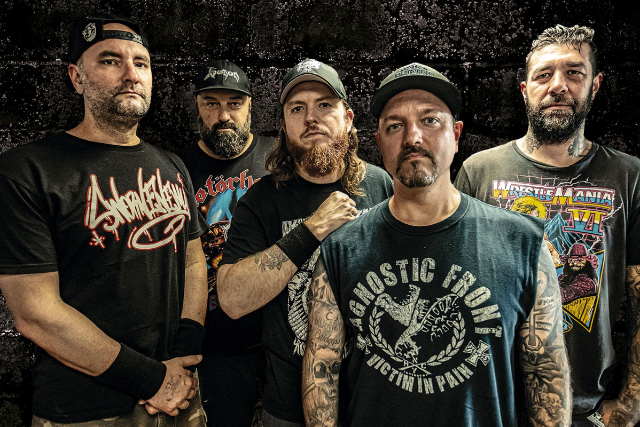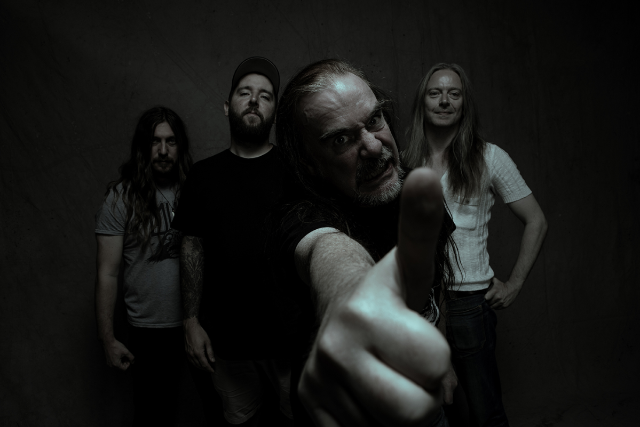About This Event
PLEASE NOTE - Marathon Music Works is a cashless venue. Only debit or credit cards are accepted at our bars, box office and guest services window. Please plan accordingly.
Need an Access Code? Sign up for our newsletter to get new show announcements, exclusive presale codes, rental discounts and more. Sign up HERE.
*Presale codes are usually sent out on Thursdays at 10am as part of our weekly newsletter.
Artist Info

A metaphorical weight is carried by almost every individual in regards to their emotional construct. Our experiences shape who we become and over time, gradually produce a heavy burden that we continue to lug along. For many of us, the weight becomes so much that we struggle to get out from underneath, let alone move. It is these struggles that are translated throughout Weight Of The False Self.
“Seen or unseen, everyone is carrying a burden. The music we love helps us bear the weight” proclaims vocalist Jamey Jasta. Tracks like “Cling To Life” supply a play on words that usually mean to desperately cling to those last breaths, but here, these words display that in the wake of true loss and mourning, to cling to the idea of happiness and future can bring sincere relief. On the other end of the philosophical spectrum, the first single “Instinctive (Slaughterlust)” not only presents a fresh vocabulary word, but screams about the power that comes from our defense mechanisms when backed into a corner. When someone is being pursued by their past, another person, or just defending their own territory, it’s only a matter of time and distance before they can explode into a savage, primal beast. “It should be illegal to make a song this heavy,” describes bassist Chris Beattie.
The song “Wings Of The Vulture'' is a metaphor for all the negative forces of nature, fate, and humanity that hope to prey upon us during some of our weakest moments; waiting for the death of something meaningful. “A Stroke Of Red,” contrary to what it may seem at first, touches on the concept of having the choice to harm yourself or others. “It’s an eye for an eye, but that leaves everyone blind. Once you go down that dark, violent path, there is no turning back. This song is a dark canvas; leaving my body to exact terrible things on a different plane, and coming back to myself in order to learn from it so that you don’t ever give in to that dark, carnal desire,” explains Jasta.
Album artwork by renowned heavy metal artist Eliran Kantor depicts a man chiseling away at the massive sculpture of a stone bust. In Kantor’s classic painting style, cracking through the clay of turmoil and sadness, a light is beginning to shine through the rock as the sculptor turns his face from the blinding beams of healing. The image visually combines the album’s themes of emotional struggle and managing to overcome pain after layers of depression, anxiety, betrayal, and heartbreak have hardened atop a person’s soul.
Over the course of over 20 years and 8 albums, the writing process for a band like HATEBREED has stayed safe in its roots, but still reached out and grabbed for crisp and compelling pieces of progressive sound to add to the mix. There are waves of fresh sounds while the massive foundation that houses HATEBREED remains strongly held in place. “On this album I really pushed myself; made myself rewrite things until they were better, until it clicked. I pulled myself out of that comfort zone. In the age of legacy bands having to play so many hits from their catalogue at shows, we love to hear fans request new songs when we’re playing live,” explains Jasta, “we’ve really played into our strengths with this one.”
“There’s no shortage of beefy-riffs and adrenaline-fueled-drums on this record. I’m proud to say that we will consistently provide a soundtrack to which you can mosh in your living room and destroy your apartment,” details drummer Matt Byrne.
Recording the album once more with the help of ZEUSS, the band experienced a sense of challenge and breakthrough that enabled them to obtain a new level of sound. After working with the band for several years, and while normally spending his time with bands that have a fairly different sound, Zeuss is able to test HATEBREED and expand their already infamous vibration. “It was really great working with Zeuss again on this one. Love the way the guitars sound,” comments guitarist Wayne Lozinak. As time goes on, the quality of production technology only seems to get better and better, creating a safe and productive nest in which albums can evolve and end up with a much cleaner sound; Weight Of The False Self brings early 2000’s era HATEBREED into the new decade.
Due to be released on November 27th, 2020 via Nuclear Blast Records, Weight Of The False Self will likely be noted as one of HATEBREED’s strongest, and most memorable albums.

Ferocious and uncompromising in their execution, CARCASS’s ability to intricately dissect the innards of death metal, and display them for us to sonically understand has been their point of excellence for over three decades. Last December (2019) the band released their first single in over 5 years “Under The Scalpel Blade,” followed by a 4 song EP entitled Despicable (October 2020), setting a potent precedent for the full length album to come in 2021: TORN ARTERIES. With the album title itself referencing an old demo created by original drummer Ken Own back in the 80’s, TORN ARTERIES sits as a bookend on the modern side of the CARCASS discography, connecting directly back to where everything began over 30 years ago.
The album artwork also rings reminiscent of the grotesque photography that appears on classic CARCASS album covers like Reek Of Putrefaction of Symphonies of Sickness. Artist Zbigniew Bielak traveled outside his normal wheelhouse to bring forth a time lapsed set of photos showing vegetables shaped like a heart, rotting over time upon a white plate. This form of artwork was influenced by Japanese Kusôzu, meaning: ‘painting of the nine stages of a decaying corpse.’
“It’s very clean, white, which we’ve never done before,” explains Vocalist and Bassist Jeff Walker, “it doesn’t look evil, or typically death metal, but I like how clean it is; almost like a coffee table book.” This new album presents images, lyrics, and sounds that so distinctly scream CARCASS, but ferry us into a new era of production, songwriting, and art all together.
“I think as our 7th album, it does stand out from the others both sonically and stylistically,” explains Walker. “You can definitely tell that it’s CARCASS; when you drop that needle on the vinyl, when you hear that guitar tone, you can tell it’s Bill Steer, but each album is always a product of its time.”
The general approach to writing hasn’t changed much over the years for CARCASS. “There’s no real designed method,” analyzes Walker, “no one’s writing a song, coming in the room, and saying: ‘this is how the song goes.’ A lot of these songs are written around a rhythm, or an idea: have we ever had a song with this type of intro? Have we ever had a song with this type of drumming? If we didn’t care, we’d do the same generic, verse-chorus song writing bullshit, but we don’t want to repeat ourselves. We’re always trying to remain creative and have a valid purpose in what we’re doing.”
With TORN ARTERIES, each track stands unique from the rest in its approach to guitar, bass, vocals and drumming, along with all the finer details. Filthy and dominating guitar work creates thick layers of tone and melody, piling on top of each other like the weight of dead flesh in tracks like “Kelly’s Meat Emporium.”
“The working title for Kelly’s was originally ‘Stock Carcass,’” laughs Walker “we knew that one was a real meat and potatoes track for the album.” Meanwhile the elevated speed and catchy beat in “Dance of Ixtab” tell a robust and airier story, one that is certain to get a reaction from live crowds. “We built this song around the beat,” explains Walker, “we had an approach to each song that was a definite idea. It’s all about ‘what haven’t we done before?’”
Curious about the lyrics? CARCASS bets you are, but don’t expect them to be an easy puzzle to solve. Over the years metalheads the world over have referenced CARCASS’s complex, bizarre, and gore filled lyrics with affection, humor, and fascination. This time around will require fans to actually purchase the physical album, and closely examine the artwork in order to place the lyrics in their proper order. “I’d rather people spend time actually going through the record, listening to it, taking the words out as they hear them, and from there try to draw their own conclusions of what the lyrics are, instead of delivering them on a plate,” chuckles Walker.
Recording and Production for TORN ARTERIES wasn’t as simple as sitting down for a few weeks and knocking it all out, but rather spread out over the course of approximately 1 year bouncing back and forth between England and Sweden. Initially, drummer Daniel Wilding did session work in Sweden at Studio Gröndahl with David Castillo while guitars were recorded at The Stationhouse with James Atkinson in Leeds, England. Eventually needing some form of residential location to finalize vocals, bass, and other guitarwork, the band headed back to studio Gröndahl in Sweden to continue work in a very relaxed atmosphere with Castillo. “There was no real big plan to do it this way, the process just organically grew on its own,” says Walker.
Most will find that the only real struggle when indulging in TORN ARTERIES is fighting the desire to start it over the second it finishes. It covers substantial new ground for a band with such a reputation, while still retaining that addictive, time honoured CARCASS sound that has come to represent the face of true death metal.

While Posthuman mined the unflinching d-beat brutality of Deathreat, blistering thrash, groove and the icy nihilism of industrial bands like Godflesh and Demanufacture-era Fear Factory, the new LP integrates in elements of paranoia-driven ambient ala Lustmord, glacially-paced doom (early Melvins, Khanate) and even Meshuggah-like polyrhythms in it’s fully-automatic onslaught. The amalgam of all of these sounds in less capable hands could easily result in a chaotic or disjointed effort, but Harms Way pull it off with style and fury. Common Suffering is nothing less than a fully-armored and mechanized instrument of war ready to detonate listeners with their incredibly memorable riffs, breakdowns, and impeccable songwriting with subtle melody and point/counter-point.
Despite Harms Way’s reputation for unrelenting, chest-beating brutality, Common Suffering surprises at several turns with quieter moments of well thought out songwriting that emphasize light and shade. It’s their understanding of how to effectively orchestrate these dynamics that makes an already ironclad record feel infinitely more merciless. This is Harms Way at peak maturity– the ambitious sound of a band traversing new ideas and succeeding with their best and most fully-realized effort to date. “We really tried not to settle on parts,” recalls guitarist Nick Gauthier. “Sometimes a direction that we could have taken in a song felt too obvious… We would just troubleshoot that until we felt creatively satisfied with the direction we were taking.”
The key to the success may be a shift to recording at Studio 4 in Pennsylvania with producer Will Yip (Turnstile, Code Orange). Going into the recording, the goal was to improve some of the bands processes, examine vocal cadences and experiment during proproduction to gain the best idea from each track. The first change dealt with refocusing members on their specific wheelhouses. While vocalist James Pligge had previously assisted with riffs, on this effort his main objective was to ensure the best vocal attack, leaning into Will Yip for advice and letting the remainder of the band take the wheel with their respective parts. The result is each individual pushing to the far reaches and creating material that has previously never been colonized by any band, or hardcore writ large, before. “Prior to this record, I helped write every single riff that we ever wrote, basically,” details Pligge on their previous process “But since this new record, Nick and Casey wrote a lot of the riffs and brought them to Chris. After some back and forth, I wrote lyrics to the finished tracks.”
The title Common Suffering is a clear nod to the collective experiences of the past three years of chaos, misanthropy, paranoia, disorder, confusion and anxiety, with the band exploring themes ranging from personal struggles with mental health, relationships, political upheaval, corruption, and political power. Pligge, who Decibel called “maybe the best vocalist in hardcore right now,” digs deep into these subjects such as the track “Cyanide” which examines the expansion of media outlets, the correlative rise of disinformation, and the pervasive impact it has on people’s lives and systems of power. Additional tracks include “Devour” which examines the impact of toxic people in one’s life, the highly personal “Hollow Cry,” where Pligge explores his own humanity and relationships, and the somewhat improbable “Undertow,” which features the haunting vocals or Kristina Esfandiari--AKA King Woman--who adds a whole new dimension to the record and helps exhibit the band’s willingness to push into uncharted territory.
As masterful and impressive as the LP is, the precision-guided cluster bombs that make up Common Suffering are just ten more reasons for Harms Way fans to queue up to see one of the best and most vicious live shows on the planet. There, amongst the wide smiles, flailing arms, creepy-crawlies, and bodies pinballing off of the edges of the pit, is where the world will see just how singular and uncommon the new effort is.

The four-piece is signed to Austrian label Napalm Records, through which their debut album “Echoes of the Soul” was released, in June 2021.
The album was recorded in Brazil at Family Mob studio, engineered by Otávio Rissato, produced by Thiago Vakka, mixed by Arthur Rizk and mastered by Jens Bogren at Fascination Street Studio. The cover art was painted by Wes Benscoter.
The full-length was also licensed and released on the same date in Brazil and Argentina by Dynamo Records, in Russia by Soyuz Music, in Japan by Ward Records and later in Mexico by Concreto Recs.
The 3 main singles off it were “From the Ashes”, “Starvation” and “Dark Night of the Soul”, which videos can be found on their label's official YouTube channel.
The promotional tour of their first album went through Latin America and Europe, featuring some important dates alongside some of the biggest names in metal and the participation in some of the main festivals around the world, such as Wacken Open Air, Rock in Rio, Primavera Sounds and Rock al Parque. In addition to that, the band is already planning to announce in the coming months the continuation of the tour in territories not yet visited by them.
Crypta just release their second album called “Shades of Sorrow”, and are currently promoting it around the world.